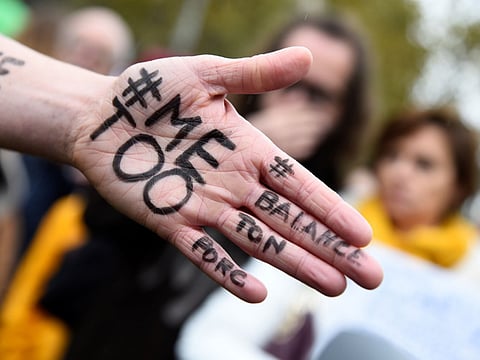#MeToo in Pakistan: Has it been fruitful?
Gulf News readers discuss whether the movement has brought forth any positive change

The #MeToo movement has clearly made its way from the West to Pakistan. Many names from the entertainment industry have been involved. Gulf News readers discuss whether the movement has brought about any positive change in the country.
Right reasons
Certain cases have distorted the real purpose
The #MeToo movement, which started in the West, is now a phenomena in South Asian countries. With recent developments and allegations, Pakistan’s media industry has joined hands to fully supporting victims and have turned their backs on the accused. However, I feel that the general population are still rejecting the movement, primarily because of some specific cases that have happened in the recent past.
One of the first major cases of #MeToo was that of popular Lollywood artists, Ali Zafar and Meesha Shafi, with the fiasco ending up in Zafar’s favour. But while the case was still in court, social media and human rights activists were in complete support of Meesha and harassed Ali Zafar across different social media platforms.
A recent case that was confused with #MeToo was that of Mohsin Abbas’ domestic violence – people labelled it as a #MeToo case and harassed Abbas, not just on social media but also publicly.
I personally believe that this movement is essential but victims are not using it for the right purposes – but in fact, accusing others of rape or sexual exploitation to demean and defame them and to be more popular in the media industry.
From Mr Joudat Waleed
PR executive based in Dubai
Improvements needed
Cultural traditions is hindering the movement
Change is always difficult to accept. And in a country where culture plays a huge role in people’s lives, change becomes even harder to adapt to. In Pakistan, the #MeToo movement has created awareness. It provided women and men with courage that they were lacking to speak their truth; which is why movements like this should exist.
But #MeToo could not live up to its full potential in Pakistan as it did in other countries, for example in the case of Harvey Weinstein. Meesha Shafi is still doing court rounds despite having enough money in her pockets – so it isn’t about money, there’s no system in place to resolve these issues. The teacher from the Muhammadan Anglo Oriental College in Lahore committed suicide after he was accused – so what does that say about the legal system in Pakistan? Did he really think there was no way out?
There is a lack of justice, and add privilege and patriarchy to the mix and you get cases of honour killings and rapes. Just because this is how things have been, it does not mean this is how it should remain. Change should come.
From Ms Rujman Ishtiaq
Social media community manager based in Dubai
Victims get a voice
Such movements are especially needed in Pakistan
The society teachings that most people in Pakistan possess are to stay quiet, regardless the torment the victim has gone through, because their justification to this is “what will the society think of you when they find out what happened?” “Imagine the shame you will cause us if you expose that you have been sexually abused!” In this society, it was vital for people to share their horrid experiences and come out loud and strong with the #MeToo movement.
The #MeToo movement has not only helped the victims, but has become the voice they needed that unfortunately their families and closed ones were deaf to.
On the contrary, some people have used this eye-opening movement to blind others with lies and falsely accuse innocent people of being the perpetrator of sexual abuse and misconduct. This leaves a detrimental effect on the wrongly accused and their close family members that can and have ruined their lives. For example, a teacher from a college in Lahore, decided to end his life because his wife left him over a student accusing him of abuse.
From Ms Haniyah Irfan
Finance head based in Dubai
Poll results
Has the #MeToo movement brought about any positive change in Pakistan?
Yes: 23%
No: 77%
Have your say
what aspects are hindering the progress of the #MeToo movement in Pakistan?



